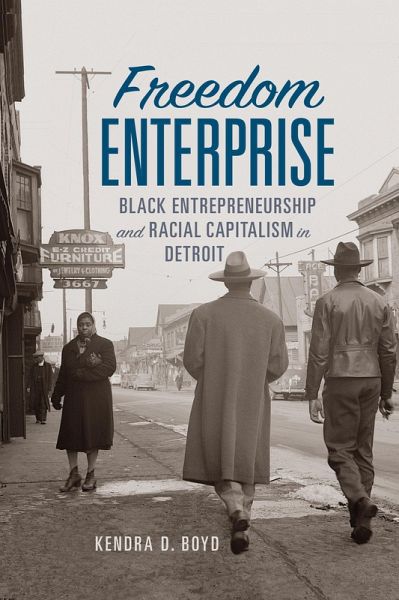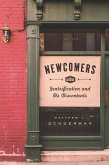Traces the rise and fall of the historic Black business community in Detroit
The Great Migration saw more than six million African Americans leave the US South between 1910 and 1970. Though the experiences of migrant laborers are well-known, countless African Americans also left the South to pursue entrepreneurial opportunities and viewed business as key to Black liberation. Detroit's status as a mecca for Black entrepreneurship illuminates this overlooked aspect of the Great Migration story. In Freedom Enterprise, Kendra D. Boyd uses "migrant entrepreneurship" as a lens through which to understand the entwined histories of Black-owned business, racial capitalism, and urban space.
Freedom Enterprise follows Black Southerners' journeys to Detroit during the initial wave of migration in the 1910s and 1920s, through their efforts to build a prosperous Black business community in the 1930s and 1940s, to the destruction of that community through urban renewal projects and freeway construction in the 1950s and 1960s. Combining business and social history methods to analyze an eclectic archive, Boyd chronicles migrant entrepreneurs' experiences, highlighting tales of racial and economic violence, Black women's business organizing, illegal business, communist entrepreneurs, and cooperative economics.
Boyd uses the framework of racial capitalism to examine migrant entrepreneurs' experiences in twentieth-century America. In the Jim Crow South, African Americans worried about white mobs taking away their property, wealth, and lives. Though they sought refuge in Detroit, migrant entrepreneurs subsequently faced the loss of their livelihoods and the businesses they had spent decades building to the bulldozers of state-sponsored urban redevelopment initiatives. Southern migrants' "freedom enterprise"-their undertaking of attaining freedom through business-was curtailed by the reality of operating within the confines of US racial capitalism.
In tracing Black entrepreneurs across the Great Migration, Freedom Enterprise provides important insights into African Americans' activism for racial and economic justice and continued racialized wealth disparities.
The Great Migration saw more than six million African Americans leave the US South between 1910 and 1970. Though the experiences of migrant laborers are well-known, countless African Americans also left the South to pursue entrepreneurial opportunities and viewed business as key to Black liberation. Detroit's status as a mecca for Black entrepreneurship illuminates this overlooked aspect of the Great Migration story. In Freedom Enterprise, Kendra D. Boyd uses "migrant entrepreneurship" as a lens through which to understand the entwined histories of Black-owned business, racial capitalism, and urban space.
Freedom Enterprise follows Black Southerners' journeys to Detroit during the initial wave of migration in the 1910s and 1920s, through their efforts to build a prosperous Black business community in the 1930s and 1940s, to the destruction of that community through urban renewal projects and freeway construction in the 1950s and 1960s. Combining business and social history methods to analyze an eclectic archive, Boyd chronicles migrant entrepreneurs' experiences, highlighting tales of racial and economic violence, Black women's business organizing, illegal business, communist entrepreneurs, and cooperative economics.
Boyd uses the framework of racial capitalism to examine migrant entrepreneurs' experiences in twentieth-century America. In the Jim Crow South, African Americans worried about white mobs taking away their property, wealth, and lives. Though they sought refuge in Detroit, migrant entrepreneurs subsequently faced the loss of their livelihoods and the businesses they had spent decades building to the bulldozers of state-sponsored urban redevelopment initiatives. Southern migrants' "freedom enterprise"-their undertaking of attaining freedom through business-was curtailed by the reality of operating within the confines of US racial capitalism.
In tracing Black entrepreneurs across the Great Migration, Freedom Enterprise provides important insights into African Americans' activism for racial and economic justice and continued racialized wealth disparities.
Dieser Download kann aus rechtlichen Gründen nur mit Rechnungsadresse in A, D ausgeliefert werden.









